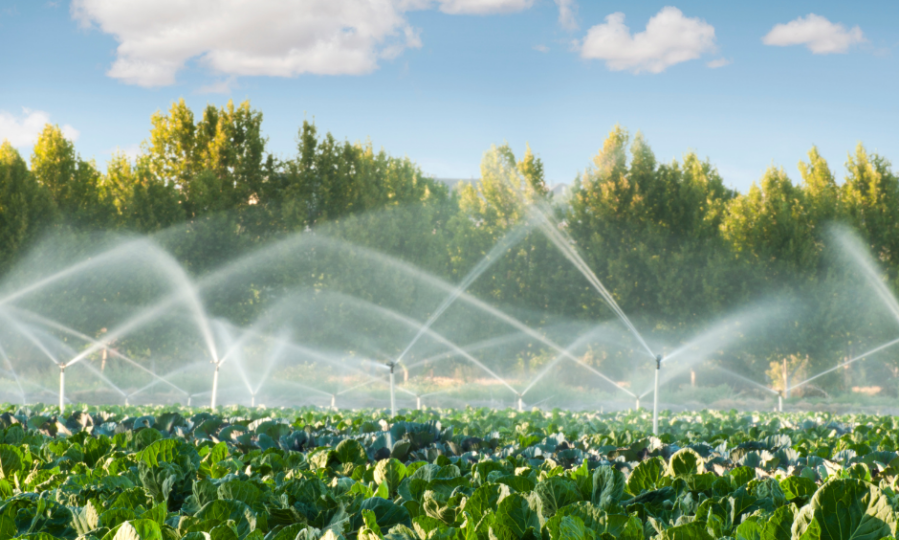
Irrigation management is essential for farms to ensure healthy crop growth, conserve water resources, reduce costs, protect the environment, and comply with regulations. With proper irrigation management, farms can begin to see improvements in crop yield and water waste while conserving natural resources. Recently, new tools and technology have produced resources that make irrigation management an easy, organized, and painless experience.
Why is Irrigation Management Important for Farms?
Irrigation management is important for farms for several reasons.
Improved crop yield
Proper irrigation management can help crops receive the right amount of water at the right time, which can lead to improved crop yield and quality. Irrigation can also help mitigate the negative effects of drought or irregular rainfall.
Water conservation
Irrigation management can help conserve water by preventing over or under-watering, which can lead to water waste. Efficient irrigation practices can also help you use water more effectively, reducing your overall water usage and helping to conserve this valuable resource.
Cost savings
Efficient irrigation management can help reduce the cost of water usage and irrigation equipment maintenance. By optimizing water use, you can also reduce the energy costs associated with pumping and distributing water.
Environmental protection
Effective irrigation management can help reduce soil erosion and nutrient leaching, as well as prevent the contamination of water sources with agricultural chemicals.
Compliance with regulations
In some regions, there are regulations on water use and irrigation practices that you must follow. Effective irrigation management can help you comply with these regulations and avoid potential penalties or fines.
With effective irrigation management practices, you can improve crop yield, reduce water waste, and conserve natural resources. Monitoring soil moisture, water quality, and irrigation scheduling helps you ensure that crops receive the appropriate amount of water at the right time. By utilizing irrigation technologies and conservation practices, you can optimize your water use and reduce your impact on the environment.
The Challenge with Irrigation Management
Some common challenges you may face with irrigation management include:
Water availability and quality
It’s common to face challenges related to water availability and quality, particularly in regions with limited water resources or with water sources that may be contaminated. This can affect your ability to irrigate crops effectively and efficiently.
Irrigation system design and maintenance
The design and maintenance of irrigation systems can also be a challenge. Proper irrigation system design and maintenance require specialized knowledge and expertise, which may not always be available. Poorly designed or maintained irrigation systems can lead to inefficient water use, which can reduce crop yield and quality.
Weather variability
Weather patterns can be unpredictable, which can make irrigation management challenging. For example, unexpected rainfall can reduce the need for irrigation, while prolonged drought can increase the need for irrigation.
Labor and resource constraints
Irrigation management may require significant labor and resources, especially for small-scale farmers. Lack of access to adequate labor and resources can make it difficult to manage irrigation effectively.
Cost
Installing and maintaining irrigation systems can be expensive, particularly for small-scale farmers. Cost constraints can limit the ability to implement effective irrigation management practices, such as installing more efficient irrigation systems or technologies.
Utilizing a Farm Management System for Irrigation Management
There are several ways a farm management system can help with irrigation management, from real-time monitoring and automated scheduling, water use tracking, integrations, and more.
Real-time monitoring
A farm management system can provide real-time data on soil moisture levels, weather conditions, and other factors that impact irrigation. This can help you make more informed decisions about when and how much to irrigate.
Automated scheduling
A farm management system can automate irrigation scheduling based on crop type, soil type, weather conditions, and other factors. This can help ensure that crops receive the appropriate amount of water at the right time, without the need for manual intervention.
Water use tracking
A farm management system can track water use for each irrigation event, as well as cumulative water use over time. This can help you identify inefficiencies and optimize your water use.
Integration with irrigation systems
A farm management system can integrate with irrigation systems, such as drip irrigation or center pivot systems, to provide more precise control over water application.
Remote access
A farm management system can provide remote access to irrigation data, allowing you to monitor and control irrigation from anywhere with an internet connection.
Overall, a farm management system like AgSquared can help you optimize your irrigation management practices, resulting in improved crop yield, reduced water waste, and increased efficiency. By providing real-time monitoring, automated scheduling, water use tracking, and integration with irrigation systems, AgSquared can help you make more informed decisions and take action to improve your irrigation practices. Contact AgSquared today to learn more about how we can elevate your farm’s productivity, profitability, and transparency.

